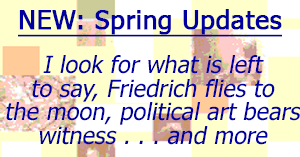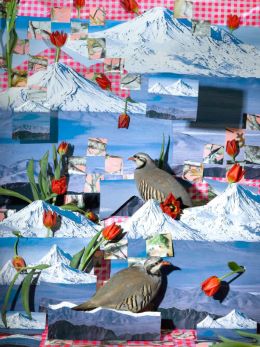Life in exile tends to come with too many memories and too little else. The parents of Sheida Soleimani, in exile from Iran, have brought something with them all the same.
Not that they had special privileges, no more than one would expect for intellectuals and dissidents at the hands of an oppressive regime. Rather, their memories have taken physical form, as “Birds of Passage,” just this past month at Denny through October 7. They take on a colorful form as well, as living creatures and in photographs teeming with life. It makes their memory harder to pin down but also harder to leave behind. Daniel Shieh, too, cannot stop thinking about his mother and her rites of passage to the United States, but the voices in his head keep multiplying, and they are still singing the national anthem. And I bring this together with a separate report on him as a longer review in my latest upload.
She has a commitment to their aspirations and their memories, but also a certain distance. Born and bred in the Midwest, she never once refers directly to their past. She does not have to look back to Islamic art or artistic ferment in Iran today. She does not have to make a grand show of leaving either one behind. Even the birds look less than exotic. As for her parents, they look as if they could easily belong anywhere—anywhere that respects their humanity and intellect.
Which would you do? Would you cherish the memories, obsess over them, or do your level best to forget? It may not be a choice for many immigrants left without a home or a work permit—and with the undisguised scorn of MAGA acolytes and New York’s law-and-order mayor. It may not have been for Soleimani’s parents either, not when their past informed present needs and present politics. It might, though, be a choice for her. She is, after all, photographing them and, as she puts it, ghost-writing their memories.
They seem determined to let go of nothing, not even a suitcase. Portraits show them each in a room, doing their best to fit it all in. They ponder the items that they pin to the wall, even as most end up somewhere else entirely. They are lucky to have a place to stand when so much else has fallen aimlessly to the floor. They are the kind of people who could keep it all perfectly organized and all in their head, but then things follow them wherever they call home. Things could well efface them entirely as well, as in a multiple exposure of Soleimani’s mother, face blurred behind recognition but everything else crisp and in its place.
Then, too, there are the birds. Her father holds a black bird by the beak while feeding it nuts. Both snuggle birds in their arms, for mutual reassurance, like a rooster named Manoocha. Nuts! Birds also have a place of their own, in photos that present them in front of a montage much like the one that they are assembling, as What a Revolutionary Must Know, but with a snowy mountain and red flowers in place of each portrait’s cryptic symbols.  They could stand in place of postcards to remember the past or as promissory notes for the future.
They could stand in place of postcards to remember the past or as promissory notes for the future.
Life forms extend to a snake in the grass—or rather on the rug and amid the documents. Are they now beyond danger? They look reasonably at ease, her mother with one arm behind her back, but Soleimani has a greater claim to composure. She has assembled all this and must enjoy watching it fall apart. She is the one making connections as well, like the literal and igurative connections of wall drawings of what might be vegetation snaking from photograph to photograph.
Maybe she can afford detachment. She can keep her sense of humor while blurring her mother’s smile. A stepladder appears, and it, too, can be easy to overlook when there is work to be done, much like the snake. Still, this is Soleimani’s game of snakes and ladders. What of other refugees without time for fairy tales—or others still left behind in Iran? They will have to find their own rights and rites of passage.
Read more, now in a feature-length article on this site.
